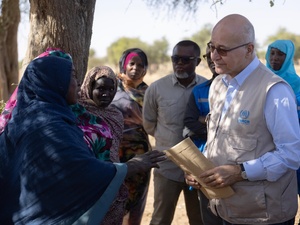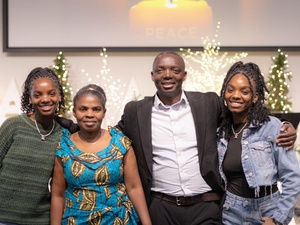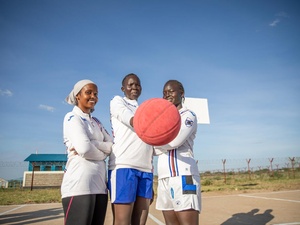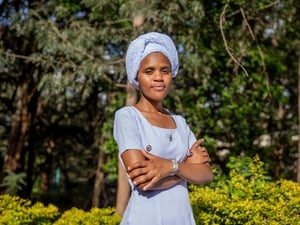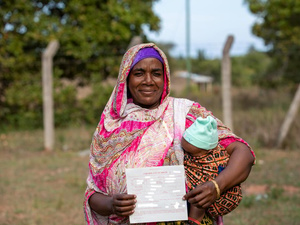UNHCR deplores killing of four Somali refugees in Mandera
UNHCR deplores killing of four Somali refugees in Mandera

Somali refugees at Kenya's Mandera site in makeshift shelters called "tukuls".
MANDERA, Kenya, May 16 (UNHCR) - The UN refugee agency on Thursday deplored the killing of four Somali refugees who had sought safety in the remote north-eastern Kenyan town of Mandera following an outbreak of inter-clan warfare in neighbouring Somalia.
"UNHCR is deeply shocked and saddened by the killing of these refugees," said the agency's Representative in Kenya, George Okoth-Obbo.
The victims, two women and two men, were struck by stray ammunition early on Wednesday when fighting flared in the nearby Somali town of Bula Hawa.
Okoth-Obbo said the incident further highlighted the need to move up to 10,000 refugees, who have fled to Kenya over the past five weeks, to a new location further away from the border. The refugees are currently massed only 500 metres inside the Kenya-Somali border, within sight and target range of heavily-armed rival Somali militias.
"It is a critical requirement of refugee protection to ensure their physical safety for as long as fighting continues in their country. I am certain that together with the Kenyan government, we will find a solution to guarantee safety and assistance to these refugees," said Okoth-Obbo.
UNHCR staff in Mandera, working closely with local Kenyan authorities, have located a new site some 7 km west of Mandera and have started preparing it to receive the refugees. Other support staff in Nairobi have been mobilised to deal with the crisis.
"The Kenyan government has been most co-operative from the start of this crisis. It realises these people are fleeing danger and are in need of protection," said UNHCR's Deputy Representative in Kenya, Arun Sala-Ngarm, who visited Mandera earlier this week.
A UNHCR plane left Nairobi on Thursday with much-needed medical supplies. Two more shipments of emergency goods will be flown to the region on Friday.
Concerned over the deteriorating security and health situation in Mandera, UNHCR on Tuesday deployed additional staff to the area to prepare for the arrival of the emergency supplies, to be flown through the close co-operation of the World Food Programme (WFP). Supplies include medicine, high-energy biscuits, water tanks, tents and vehicles. Two non-governmental organisations, Oxfam-Quebec and Trocaire, already operating in Mandera are helping with the provision of water supplies and the digging of pit latrines.
Lack of access to water, sanitation and food are major concerns as far as assistance is concerned, but there is also an acute shortage of firewood. At least three children were reported to have died earlier this week following an outbreak of acute diarrhoea. More than 12 others are reportedly still in Mandera's over-stretched local hospital.
The first wave of some 5,000 refugees arrived in Mandera nearly a month ago to escape fighting in their villages in and around the town of Bula Hawa. A second influx entered Kenya at the beginning of May, taking the overall number to at least 10,000, of which some 80 percent are women and children.
The crisis has stretched UNHCR's limited resources to breaking point. "We are scrambling for all possible sources and support to find the money for this operation," said Okoth-Obbo. "These are people who need our support, so we have to act now and hope that donor support will be forthcoming."


